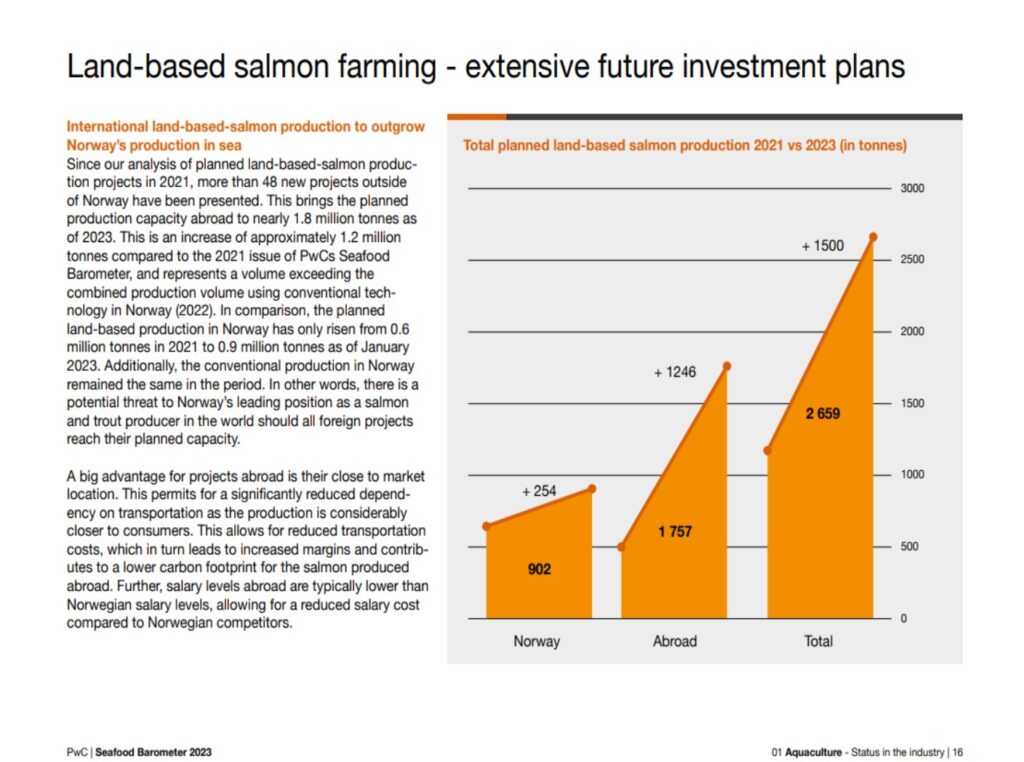
News
Industry update
Research
Sustainability
Technology
Norway aquaculture survey shows low confidence in land-based operations
March 16, 2023 By Nestor Arellano
 (Image: PwC)
(Image: PwC) PwC Seafood Barometer, the global auditing and consultancy firm’s yearly status update on Norway’s aquaculture industry, unearthed skepticism among a majority of seafood managers about the future of land-based aquaculture in the country. Despite a tight investment environment, some recirculating aquaculture system (RAS) projects “will see the light of day within the next couple of years,” according to the survey that questioned 93 managers in Norway’s seafood space about their assessment of the industry’s future.
“We have asked what the industry thinks of the large number of planned investments in land-based production. Sixty-eight per cent of our respondents believe that land-based salmon farming is ‘a bucket of empty promises’,” according to the PwC Seafood Barometer 2023 report.
PwC Norway said the skepticism is understandable as fish farmers are aware of that land-based operations involves a long and difficult journey that “will require multiple hundred billion NOK in investments.”
“Given the current macroeconomic picture in the world, these companies might experience that money is kept tighter in investor pockets, as investors seek investments associated with lower risk,” the report said. “However, we are confident that some of these projects will see the light of day within the next couple of years.”
Hanne Sælemyr Johansen, partner as PwC, said that Norway’s aquaculture industry is facing a myriad of challenges that include nature calamities, the COVID pandemic, the war in Ukraine, as well as the energy crisis, raw materials shortage, rising inflation, and “uncertainty related to political processes, increased taxation.”
Last year, the government of Norway proposed a 40 per cent tax on aquaculture that is widely believed will have a negative impact on the industry.
“With such a troubled macro picture, this creates great uncertainty for business in general – also for the Norwegian seafood industry,” Johansen said. “These are all elements that may contribute to a perfect storm for the industry.”
Land-based-salmon producers are faced with challenges both financially and environmentally. One of the largest cost drivers in land based-salmon farming is the cost of energy.
The available energy consumption figures from operating land-based farmers with RAS-technology, indicate an average energy consumption of around 13.6 kwh per kg, whilst estimates for projects currently being developed quote future consumption levels in the interval 5-8 kwh per kg, the report said. Energy cost in land-based farming is between 11-28 times higher than in conventional seafood farming.
In 2017, Norway set a growth vision of reaching five million tons of seafood production by the year 2050. Three out of four seafood managers interviewed for the survey do not think the country will reach that vision by 2050.
“The rise of land-based technology, combined with a possible significant tax disadvantage of conventional technology, indicates that the vision of five million tons is probably more unrealistic than ever,” said Joahn F. Selle, manager at PwC Norway.
Print this page